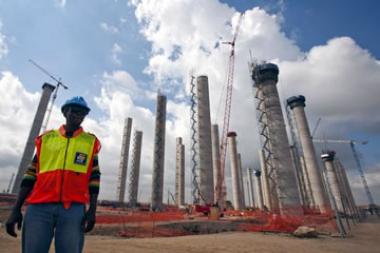Infrastructure development to increase SA’s competitiveness in an era of Growth and Globalisation
 The Government's infrastructure development efforts will undoubtedly help increase South Africa's competitiveness in an era of increasing globalisation.
The Government's infrastructure development efforts will undoubtedly help increase South Africa's competitiveness in an era of increasing globalisation.
The Government's infrastructure development efforts will undoubtedly help increase South Africa's competitiveness in an era of increasing globalisation.
The State of the Nation Address made by President Zuma on 14 February 2013 had a strong focus on tackling socioeconomic problems such as poverty, inequality and unemployment in order to create an environment where access to basic services such as water, electricity and sanitation is a minimum standard.
President Zuma spoke of the aims of the National Development Plan where jobs, housing, public transport, adequate nutrition, education, social protection, quality healthcare, recreation and a clean environment would be a matter of course rather than discourse.
Some progress has been made since President Zuma’s last State of the Nation address, with a specific focus on the more than R860 billion that has been spent since 2009 on infrastructure upgrades and development.
In an interview with SA Commercial Prop News, Adrian Goslett, CEO of RE/MAX of Southern Africa said there is no doubt that this investment in infrastructure will assist in boosting certain areas. For example, the vast amount of electrical transmission lines that were laid down will improve power supplies to economic hubs around the country, as well as bring power to rural areas that did not previously have access to electricity. It is also remarkable that the extension of basic services through the infrastructure programme has meant that approximately 200 000 more households now have electricity and 315 000 solar water geyser were provided to poor households that are now able to have hot running water.
Approximately 85% of homes now have access to electricity and nine out of ten households have access to water. These have been basic needs that many South Africans had previously gone without.
That said, in order to continue to improve the basic living standards of South Africans, a much stronger economy is needed if government is to sustain the ambitious National Development Plan that aims to create over 11 million employment opportunities by 2030, among other things.
In fact, President Zuma even stated that South Africa’s GDP would have to grow by more than 5% in order to create more jobs, yet the current expectation of GDP growth is only at 2.5%.
Despite numerous economic challenges that have gone before and that lie ahead, it is encouraging that the government has made provisions and are taking steps towards improving the youth employment level. It is important that the government continues with the focus on empowerment of the youth as they are the future of the country and the ones who will continue to improve the economy in years to come.
If employment figures remain low, all sectors of the economy will suffer and continue to see slow progress. It is well known that unemployment and access to finance have been the two dominant factors that have prevented consumers, especially first-time buyers, from entering the property market and investing in a home in recent years.
It will be interesting to see what happens with the hotly debated land reform principles and policies the government is proposing within its prioritisation of land reform which includes a move away from the ‘willing buyer willing seller’ process and includes possible limitations on foreign land ownership
It is currently unclear as to how the announcement on foreign nationals owning land in South Africa will impact the property market. No clarification has been given as to whether this restriction relates to state-owned or privately owned land, and whether it relates to just agricultural land or if it will be implemented across the board. If this proposed limitation of foreign ownership relates only to state-owned rural land, it will have far less effect on the market than if it refers to property in general.
Currently only about 1% of South African property is owned by foreign nationals and less than 5% of all property sale transactions in South Africa are concluded with buyers from outside our borders. The large majority of buyers in the residential property market are from South Africa, and even during the property boom period, foreign buyers only accounted for approximately 6% of the market share.















